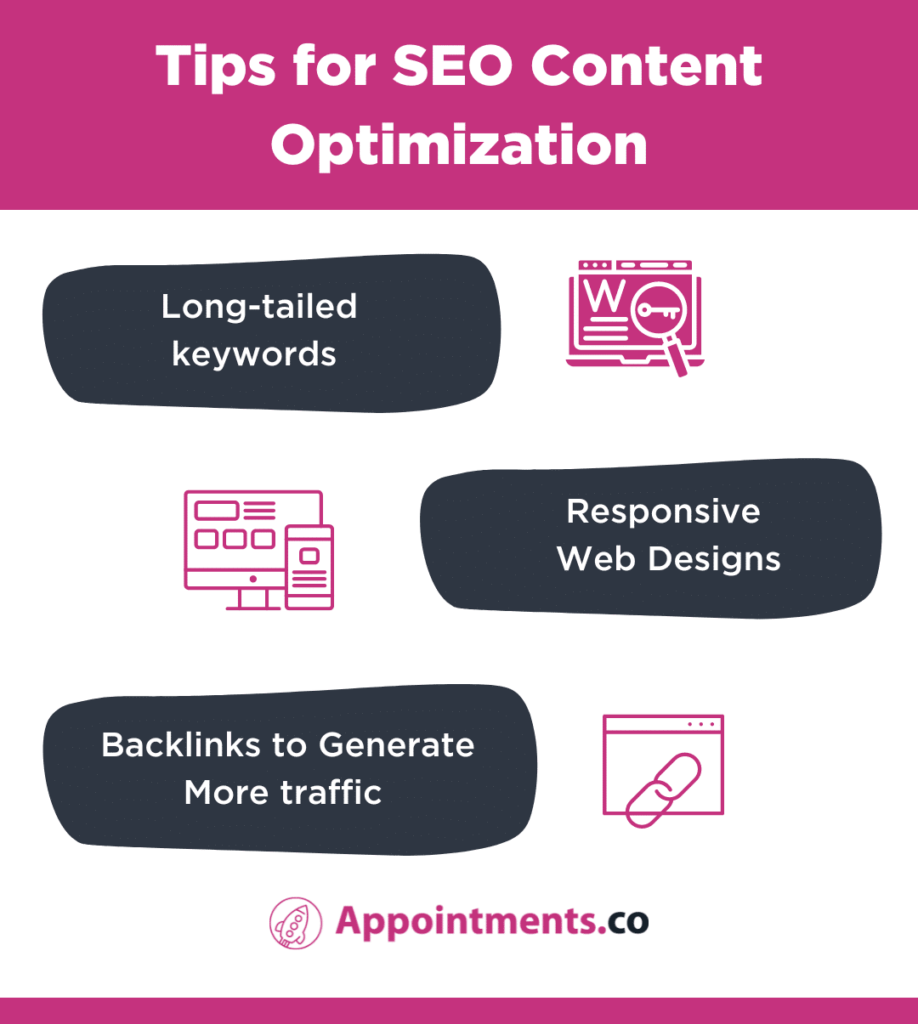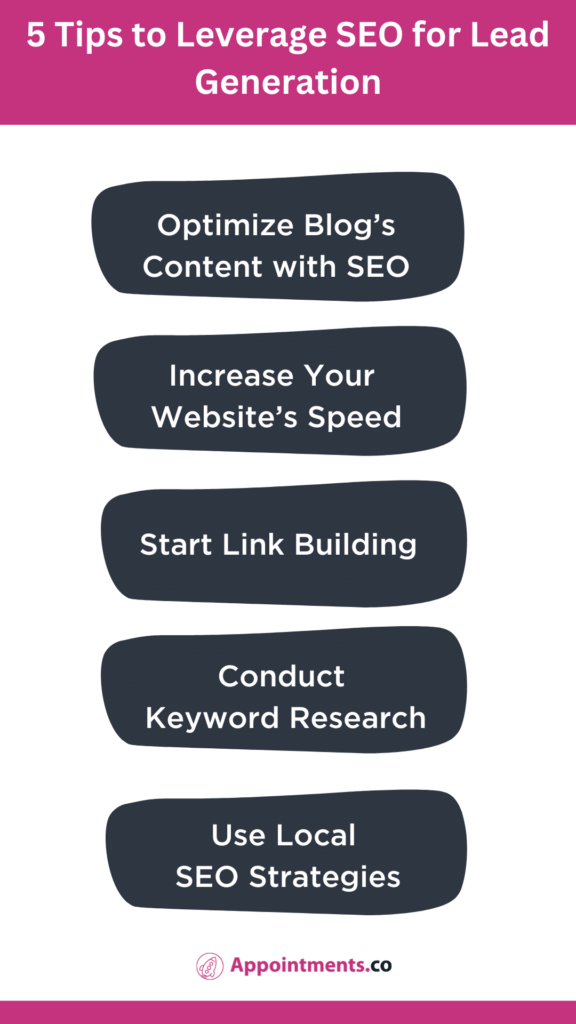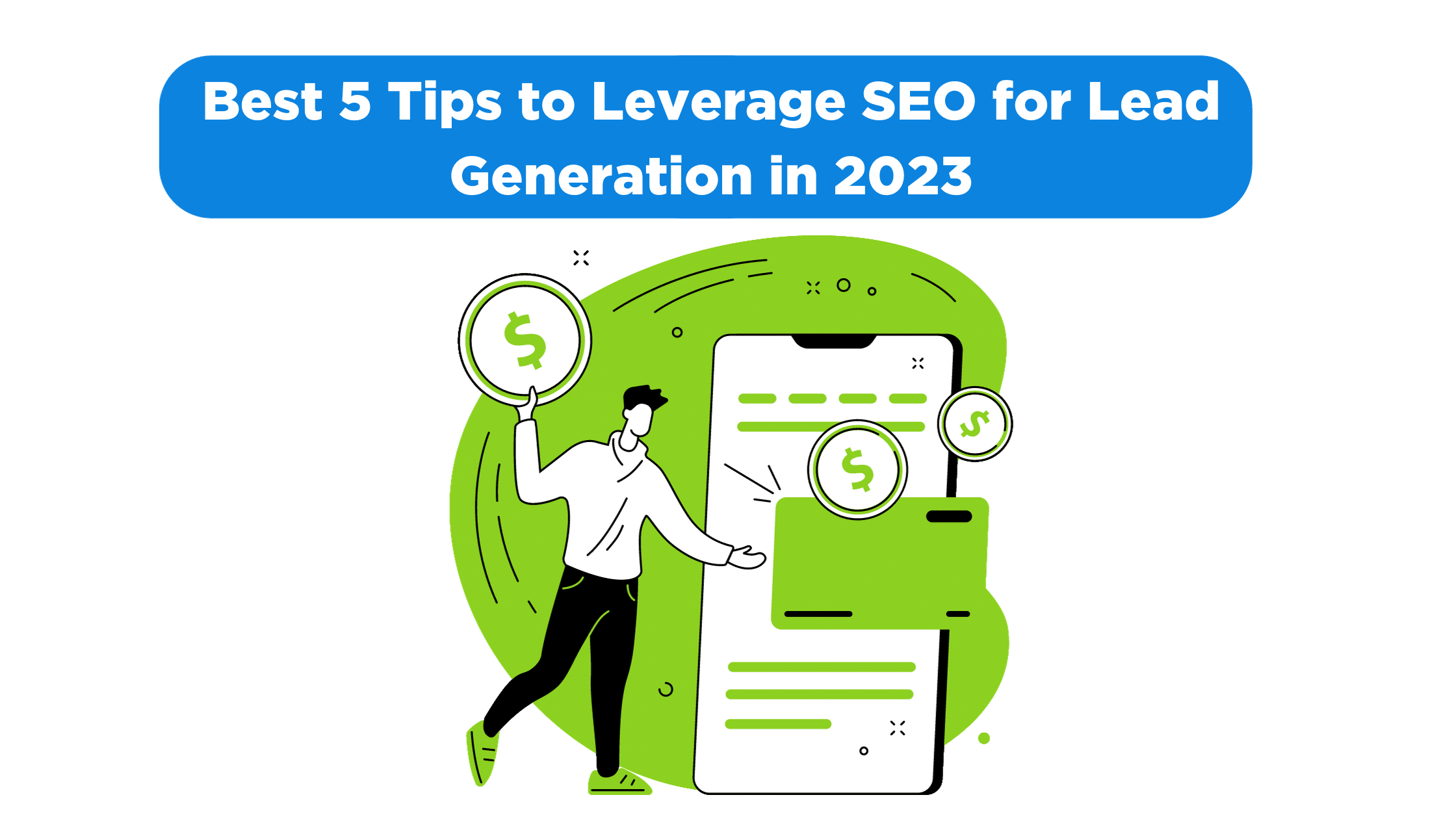Lead generation and SEO are two essential elements needed for a business to create an effective marketing plan for business growth. SEO for lead generation helps cultivate interest and induces curiosity in your target audience about your business.
Attracting qualified prospects and nurturing them in hopes of transforming them into your paying customers and your brand’s loyal ambassadors is possible only if your content is SEO optimized. Businesses cannot survive without leads. SEO and lead generation are different from each other, but when combined together it acts as a powerful SEO lead generation strategy to drive massive return on investment for your business.
In this article, let’s take a look at the 5 best tips in SEO for lead generation.
Table of Contents
- Why Do You Need SEO for Lead Generation?
- What Are the Benefits of SEO for Lead Generation
- Why Is Search Engine Optimization Essential?
- How to Optimize Your Content with SEO?
- How Does SEO Work with Lead Generation?
- 5 Tips to Leverage SEO for Lead Generation
- FAQs
- Final Thoughts
Why Do You Need SEO for Lead Generation?
SEO for lead generation is important because when someone searches for a relevant keyword that is related to your business, SEO helps ensure that your website shows up in the search engine results. It helps you not only provide easy access to people for your business’s products and services, but also improves lead generation by reaching out to more prospective customers.
The success of any digital marketing strategy depends on the most effective and essential search engines, as they help people learn about your products and services in addition to lead generation.
What Are the Benefits of SEO for Lead Generation
- Ranking higher in SEO is a faster, more effective, and cheaper way to get better ROI (Return on Investment).
- SEO helps create brand awareness and influence people’s opinions about your product and service.
- SEO helps increase your website’s organic traffic, thus helps generate leads that are qualified with a zero-cost of budget for advertising and promotion.
- Regardless of the type or nature of your product or service, or the size of the budget, you can use SEO to generate leads.
Why Is Search Engine Optimization Essential?
SEO is essential in order to reach out and engage with your target audience. It greatly influences people’s opinions by creating awareness about your product or service.
This gives you a better chance to edge over your competitors if you dedicatedly optimize your website with SEO strategies. It gives you the advantage of generating more qualified leads that are looking to buy products or services like yours online.
How to Optimize Your Content with SEO?
Keywords are the key. People use keywords to search for the information they want to see, which is why it plays an important role in SEO. There are also other important things that you should take into consideration other than keywords, like:

- Long-tailed keywords
- Responsive web designs
- Backlinks to generate more traffic
How Does SEO Work with Lead Generation?
Actively work on your organic SEO, which has the potential to improve your lead generation activities by increasing your visibility to a wide range of target audiences. Using the best SEO practices on the content of your website can help you find it more easily online by search engines since the content is updated frequently with unique and rich SEO media that would be appealing to the taste of all types of audiences.
This makes SEO and generating leads inseparable as only SEO can increase your visibility online, and helps you improve lead conversion.
5 Tips to Leverage SEO for Lead Generation
Now that you understand why you essentially need SEO for lead generation, boosting your client base, increasing sales, and growing your overall business, let’s look at some of the best tips and tricks to leverage your SEO for lead generation.

1. Optimize Blog’s Content with SEO:
One of the most effective ways to acquire more leads is by building an active blog with optimized and relevant blog posts. A blog has all the elements combined, that you need for a good search-engine-optimized website. By frequently posting your content, you are essentially maintaining the freshness of the content, keywords, images, backlinking, and engagement with your audience through social media.
Here are some of the basics of SEO optimizing your blog:
- Keyword research is essential to find relevant and important keywords in your domain and industry. Embed the right keywords in your blogs and headlines, but remember to keep it natural and do not stuff keywords, as this might result in penalties from Google.
- Publishing at regular intervals is one of the great SEO efforts and creates more consistent content.
- Using subheadings, like H2, H3, and H4 can help to make your content skimmable and improves user experience. This helps Google Analytics understand what your content is about.
- Add links to your content each time you publish a post on your website. It helps the usability, visibility, and trustability of your content.
- Encourage and manage customer reviews, as they are one of the most essential factors that impact SEO, as well as the overall ranking of your website. They act as an indication to Google and also for other search engines that your website is trustworthy and authoritative.
2. Increase Your Website’s Speed
The speed and the response rate of your website greatly affect your ranking in search engine results pages. The foremost goal of Google is to provide its users with the smoothest experience possible, so the speed of a website is a huge factor that helps them achieve that goal. The faster the response rate of your website to a search intent, the higher Google will rank it.
Here are some effective ways to increase the speed of your website:
- Use a trustworthy provider of web hosting.
- Optimize your website and make it user-friendly for mobile users.
- Use an optimizer plug-in, like TinyPNG, for your website images.
- Use plug-ins, like WP Fastest Cache, to optimize your scripts.
- Remove plug-ins and scripts that are unnecessary.
- Check and fix your broken links and delete spam comments.
- Use plug-ins, like WP-Optimize, to clean up your database.
You can use some tools, like Pingdom to check and keep an eye on your website speed. You can start making improvements to your website by decreasing the loading time based on the suggestions given by the tools once you know how your website is performing.
3. Start Link Building:
Link building is acquiring links from other sites to your own website. These links help users to easily navigate between websites and pages. They also help search engines to crawl between each individual page on your website, as well as between entire websites on the internet.
Link building is an important part of your SEO lead generation strategies, but it is also essential to do it properly if you expect it to positively affect your results with all your efforts. In that sense, you must maintain your website with organic and high-quality backlinks from trustworthy sources that can help you improve your website’s ranking in search engines for your own domain. Manually reaching out to bloggers for guest posts and placement of links is still a credible way of link-building.
4. Conduct Keyword Research:
Keyword research is critical for a successful SEO campaign. It involves finding content that users type into search engines when they search for information, product, or service. When done right, keyword research acts as a strong foundation for all your online marketing efforts and helps make decisions.
You can use keyword research tools from many available types of tools through which you can find the relevant keywords that can lead a prospect to your website. It can increase your website traffic, increase sales, convert more leads, and improve your ROI.
You can learn from one of the many useful videos of Neil Patel that show how to conduct keyword research for your website in just 60 seconds.
5. Use Local SEO Strategies:
Having your own website opens a wide range of opportunities for your business to be visible to the whole online community. In contrast, local SEO focuses more on helping you rank higher in the area where your business actually operates.
If you have a local business, you will receive greater benefits from using the local SEO strategies that ensure you are visible to the local target audience you find on Google.
Frequently Asked Questions
1. Can SEO help in lead generation?
Search engine optimization helps you generate and capture leads, and improves brand awareness. When a business generates leads by posting content on its website or through any practices without paying, it is known as SEO lead generation.
2. How do I land SEO clients?
Here are some of tips to land SEO clients:
1. Do SEO audits for the site.
2. Specialize in a particular niche.
3. Conduct or participate in marketing conferences.
4. Share your expertise in SEO on social media.
5. Send outreach messages on LinkedIn, and make sure they are not considered spam.
3. How do you promote lead generation?
These are some ways you can promote lead generation:
1. Create landing pages for special discounts and offers.
2. Establish your presence on social media.
3. Leverage SEO to boost your website traffic.
4. Create compelling content
Final Thoughts
SEO for lead generation is a marketing effort that effectively creates a strong base for your business objectives in the long term. These best SEO tips and practices will drive traffic consistently to your website, and you can move further forward by nurturing your leads for sales.
Keep in mind that, it does not matter what kind of content or blog you have, follow these best SEO practices for more lead generation. For more marketing and sales-related information and for effective appointment services reach out to Appointment.co.
Illustrations – Storyset



